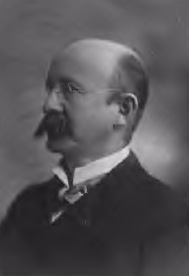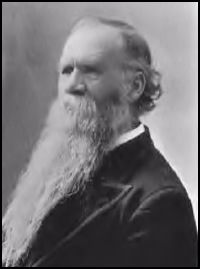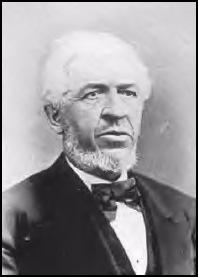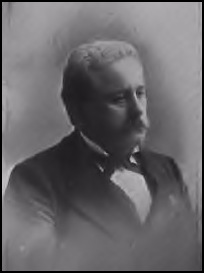Progressive Men of Iowa
1899
 BENNETT,
Henry, a well known insurance inspector and rate
maker of Cedar Rapids, has been in business in
Iowa for about thirty years. He came to the
state with his parents in 1855. They settled in
Iowa City, remaining there about two years, when
they moved to Cedar Rapids, which has since been
Mr. Bennett's home, with the exception of a
temporary absence of two years. He is the son of
Henry Bennett and Angeline Fife Bennett, and was
born in Pittsburg, Pa., October 29, 1850. His
father, who came to America when a small boy,
was born in York, Eng., in 1827. He followed the
merchant tailoring business for more than fifty
years, having only recently retired. Mrs.
Bennett was, as her name indicates, of
Scotch-Irish descent and was born near
Pittsburg, Pa, in 1830. Their son attended the
public schools in Iowa City and afterward
graduated from the Cedar Rapids high school in
1867. BENNETT,
Henry, a well known insurance inspector and rate
maker of Cedar Rapids, has been in business in
Iowa for about thirty years. He came to the
state with his parents in 1855. They settled in
Iowa City, remaining there about two years, when
they moved to Cedar Rapids, which has since been
Mr. Bennett's home, with the exception of a
temporary absence of two years. He is the son of
Henry Bennett and Angeline Fife Bennett, and was
born in Pittsburg, Pa., October 29, 1850. His
father, who came to America when a small boy,
was born in York, Eng., in 1827. He followed the
merchant tailoring business for more than fifty
years, having only recently retired. Mrs.
Bennett was, as her name indicates, of
Scotch-Irish descent and was born near
Pittsburg, Pa, in 1830. Their son attended the
public schools in Iowa City and afterward
graduated from the Cedar Rapids high school in
1867.
He began, his
business career as an office boy in the law
office of Greene & Belt. Judge George Greene
was the judge of the state supreme court and
compiled Greene's Iowa reports. During the war,
although young Bennett was not old enough to
join the army, he worked on a farm during the
summers of 1862-3-4-5. Early in the year 1868 he
entered the law and insurance office of West
& Eastman, where he studied law and looked
after the details of fire insurance and
afterward became a member of the firm. The
insurance business increased so as to require
all his time and attention and he never began
the practice of law or applied for admission to
the bar. Soon after, he acquired the insurance
business of the firm and conducted it until
1881, when he formed a partnership with A. R.
West, continuing in law and insurance for two
years, when he sold to his partner and his son,
and accepted the position of compact manager,
fixing rates and supervising business for nearly
all the fire insurance companies transacting
business in Iowa. He resigned this position
January 1, 1895, and accepted the state agency
of the Fire Association of Pennsylvania, which
he resigned in June, 1896, to establish an
independent rating, fire map and inspection
bureau. The legislature had passed a law
prohibiting any combination of insurance
companies in regard to rates. It became
necessary to have some standard to follow and
some inspection of business, so Mr. Bennett,
enjoying the confidence of the insurance
managers of the state in a high degree,
established this independent bureau which has no
connection with any board, compact or alliance,
and is in no sense a combination. Through its
agency all risks taken in the state are
inspected, advisory tariffs of equitable,
uniform and discriminating rates are published
and information is furnished to subscribers
relating to hazards, faults of management and
condition of risks, at a low rate of expense.
The system has worked satisfactorily and has
accomplished its desired purpose. There are but
four similar bureaus in the United
States.
Mr. Bennett has
affiliated with the democratic party since 1872,
but has never held any office. He was junior
deacon, secretary and junior warden of Crescent
Lodge No.
25, A. F. and A. M., for a number of
years, and was high priest of Trowel Chapter
No.
49, R. A. M., and was a member of Apollo
Commandery No. 26; he was first lieutenant
commander of the Grand Consistory Iowa, under
the jurisdiction of the Supreme Council of the
United States, their territories and
dependencies, Scottish Rite Masons.
He belongs to St.
Paul's M. E. church, in
Cedar Rapids. Mr. Bennett was married April 26,
1883, to Ella Janet Evans. They have four
children, Helen E., born May 16, 1884; Max, born November 24,
1886; Mary, born July 1, 1891, and Alice, born
May 22, 1898. Mr. Bennett is thus seen to be one
of the pioneers of Cedar Rapids, having
witnessed its growth from a riverside hamlet to
one of the best cities in the
state.
 BOYD, Hugh, teacher and
clergyman of Cornell college, Mount Vernon,
Iowa, was born August 6, 1835, in Keene,
Coshocton county, Ohio. His father was Daniel
Boyd, who was born near Ardara, parish of
Inniskeel, County Donegal, Ireland, and his
mother was Jane Elliott, of Glenconway, parish
of Killibegs, County Donegal, Ireland. They came
to this country in 1819 to escape the infamous
system of land tenure in their native land.
Daniel Boyd's father and mother were Robert Boyd
and Jane Ramsey, and his wife was a daughter of
John Elliott and Frances Blaine. The preceding
generation were Albert Boyd, Mr. Ramsey and Kate
Karrigan, John Elliott and Annie Lee, Moses
Blaine and Jennie McKee. When Daniel Boyd first
came to America he was a teacher, and afterwards
engaged in weaving fine linen and coverlets, and
was a retail merchant in Jefferson and Coshocton
counties, Ohio. In 1839 he
removed to Athens county, Ohio, and opened up a
farm out of the native forest, where, for the
remainder of his life, he expended his energies
to good purpose. He was an active worker in all
religious, political, humanitarian and
educational movements of his time. He brought up
a large family of children, and all of them now
living are well established in life. BOYD, Hugh, teacher and
clergyman of Cornell college, Mount Vernon,
Iowa, was born August 6, 1835, in Keene,
Coshocton county, Ohio. His father was Daniel
Boyd, who was born near Ardara, parish of
Inniskeel, County Donegal, Ireland, and his
mother was Jane Elliott, of Glenconway, parish
of Killibegs, County Donegal, Ireland. They came
to this country in 1819 to escape the infamous
system of land tenure in their native land.
Daniel Boyd's father and mother were Robert Boyd
and Jane Ramsey, and his wife was a daughter of
John Elliott and Frances Blaine. The preceding
generation were Albert Boyd, Mr. Ramsey and Kate
Karrigan, John Elliott and Annie Lee, Moses
Blaine and Jennie McKee. When Daniel Boyd first
came to America he was a teacher, and afterwards
engaged in weaving fine linen and coverlets, and
was a retail merchant in Jefferson and Coshocton
counties, Ohio. In 1839 he
removed to Athens county, Ohio, and opened up a
farm out of the native forest, where, for the
remainder of his life, he expended his energies
to good purpose. He was an active worker in all
religious, political, humanitarian and
educational movements of his time. He brought up
a large family of children, and all of them now
living are well established in life.
The educational advantages
were not many, but the training of the future
teacher and preacher was not neglected. There
were the weekly papers, the daily reading from
the new testament, the earnest and beautiful
prayers of the boy's father and mother, and the
frequent visits of the pioneer preacher. On
these occasions every subject of human interest
was discussed between him and the boy's
father. The boy was
silent and listened. There was a little district
school of irregular attendance of two or three
months each year, and finally a seminary was
opened in a little village five miles away. Here
the boy was prepared for college in a
surprisingly short time. Often he had to walk
the entire distance to the seminary, but he
always got there and made the best use of his
time. The farm had made him familiar with hard
work and he was not afraid of it. He entered
the Ohio university and was graduated with the
honor of valedictorian in 1859. Some years later
he was further honored with the degree of doctor
of divinity.
Professor Boyd, after
several years of service as a teacher in the
public schools of Ohio, and, after having
labored several other years as a clergyman in
the Methodist Episcopal church, was, in 1871,
transferred from the Ohio annual conference to
the Upper Iowa annual conference, and appointed
professor of Latin in Cornell college. This
position he now holds and has adorned with many
years of earnest and effective service. He
follows no stereo-typed method, but has, in
great part, made the Latin a living longue
rather than a dead language. His work has
received substantial endorsement from Harvard
uni versity, from the fact that several students
after they had received their early training at
Cornell entered Harvard for more advanced work,
and the number of courses required of them was
lessened as compared with the number of courses
required of students coming from other colleges
of similar grade. While devoting himself mainly
to his duties as teacher. Professor Boyd has
been in demand both at home and abroad for
addresses, lectures and sermons, in which he has
demonstrated himself to be a speaker of
commanding force and eloquence. He is often
called upon in his own town and no one is
received with more kindly interest and generous
attention. Aside from
his regular duties he is deeply interested in
the study of sociology. Besides his membership
in other organizations he is a member of the
Beta Theta Phi, and belongs to the order of
Knights of Pythias, and is a Knight Templar in
the Masonic fraternity.
Professor Boyd was married
August 20, 1860, to Ida Patterson, daughter of
James Patterson and Martha Henry Patterson, of
Amesville, Ohio. Two children were born to them:
Luella, born October 25, 1863, and Robert Allyn,
born July 17, 1866. Mrs. Boyd died October 21,
1867. Professor Boyd was married the second
time, August 20, 1874, to Mary Ellen Moody,
daughter of Gen. Granville Moody and Lucretia
Elizabeth Harris Moody, of Ohio. To them were
born four children: Granville Moody, born June
12, 1877, died November 3, 1879; Clifford Moody,
born October 21, 1879; Lucy Moody, born
September 12, 1881; and Elizabeth Moody, born April 17, l887,
and who died April 20, 1887.
 DOUGLAS, George, late of
Cedar Rapids, was born in the county of
Caithness, Scotland, April 17, 1817. He came to
Rochester, N. Y., in 1848, and engaged in canal,
railway and bridge construction in western New
York, continuing in this work until 1852. In
that year he followed the general western
movement and moved to Illinois, where he engaged
in various railway and bridge building contracts
at Dixon, 111., and vicinity. Here his work
lasted until 1855, when he took contracts for
building a portion of the railway line now
operated by the Illinois Central railway, west
of Dubuque, Iowa. From 1855 until 1870 he was
actively engaged in railway construction, mostly
in Iowa and Nebraska, doing much of the work on
the lines now operated by the Illinois Central
railway across the state of Iowa, also the
present main line of the Chicago &
Northwestern railway in Iowa, and a considerable
portion of the Fremont, Elkhorn & Missouri
Valley railway in eastern Nebraska. DOUGLAS, George, late of
Cedar Rapids, was born in the county of
Caithness, Scotland, April 17, 1817. He came to
Rochester, N. Y., in 1848, and engaged in canal,
railway and bridge construction in western New
York, continuing in this work until 1852. In
that year he followed the general western
movement and moved to Illinois, where he engaged
in various railway and bridge building contracts
at Dixon, 111., and vicinity. Here his work
lasted until 1855, when he took contracts for
building a portion of the railway line now
operated by the Illinois Central railway, west
of Dubuque, Iowa. From 1855 until 1870 he was
actively engaged in railway construction, mostly
in Iowa and Nebraska, doing much of the work on
the lines now operated by the Illinois Central
railway across the state of Iowa, also the
present main line of the Chicago &
Northwestern railway in Iowa, and a considerable
portion of the Fremont, Elkhorn & Missouri
Valley railway in eastern Nebraska.
Mr. Douglas was associated
with Mr. John I. Blair in his projection of the
various railway lines in western Iowa, and many
miles of the grading, bridging and track laying
of the railways promoted by the companies of
which Mr. Blair was president, were completed by
the firm of Douglas, Brown & Company, of
which the subject of this sketch was the senior
partner. From 1870 to 1873 Mr. Douglas engaged
in his last work in railway construction,
completing 155 miles of the International &
Great Northern railway in Texas, including the
grading, bridging, track laying and depot
building complete. In 1874 he
associated himself with Mr. Robert
Stuart, now of Chicago, under the firm name of
Douglas & Stuart, and engaged in the
manufacture of oatmeal and other cereal
products, at Cedar Rapids, and continued in
active connection with the business until the
time of his death, in May, 1884.
The firm of Douglas &
Stuart extended its operations materially, and
at the time its properties were acquired by the
American Cereal company, was the largest
producer of goods in the cereal line in the
world.
Mr. Douglas married
Margaret Boyd at Dixon, 111., in 1855. She was
born in the north of Ireland. Mrs. Douglas and
three sons, George Bruce, Walter D.. and William
Wallace, live in Cedar Rapids at the present
time.
 FOUSE,
Rev. Dewalt S., D. D., of Lisbon, is a native of
Huntingdon county, Penn. He was born near
Marklesburg, in that county, November 15, 1840.
His father, Dewalt Fouse, was born December 26,
1802, in Blair county, Penn., and was a minister
in the Reformed church in the United States. His
grandfather was a native of Bavaria, Germany,
and came to America in 1784. Dewalt Fouse was
married March 25, 1823, to Nancy Shontz, who
was born in Huntingdon county. Her father,
Christian Shontz, and her mother, Margaret Huber
Shontz, were both natives of Lancaster county,
Penn., although of Swiss descent. FOUSE,
Rev. Dewalt S., D. D., of Lisbon, is a native of
Huntingdon county, Penn. He was born near
Marklesburg, in that county, November 15, 1840.
His father, Dewalt Fouse, was born December 26,
1802, in Blair county, Penn., and was a minister
in the Reformed church in the United States. His
grandfather was a native of Bavaria, Germany,
and came to America in 1784. Dewalt Fouse was
married March 25, 1823, to Nancy Shontz, who
was born in Huntingdon county. Her father,
Christian Shontz, and her mother, Margaret Huber
Shontz, were both natives of Lancaster county,
Penn., although of Swiss descent.
Young Mr. Fouse
received his early education in the common
schools of his county and at Marklesburg
academy. The young man was naturally studious
and made full use of his opportunities for
acquiring knowledge. He entered Franklin
Marshall college at Lancaster, Penn., in 1859.
His college course was interrupted by the
rebellion, and September 16, 1861, he enlisted
as a private in Company C, Fifty-third
Pennsylvania volunteers, commanded by Col. John
R. Brooke, now active in the service at Havana,
Cuba, as military governor. Mr. Fouse was soon
made orderly sergeant, and December 14, 1862,
was promoted to first lieutenant of his company.
During much of the time he acted as adjutant of
the regiment, and when mustered out, October 9,
1864, he was acting assistant adjutant-general
of the Fourth brigade, First division, Second
army corps. Gen. W. S. Hancock was commander of
the corps. Lieutenant Fouse participated in the
battles of Fair Oaks, Gains Mills, Peach
Orchard, Savage Station, White Oak Swamp,
Malvern Hill, Second Bull Run, Antietam,
Fredericksburg, Chancellorsville, Gettysburg,
Mine Run, and in the battles of the Wilderness
campaign from the Rapidan river to Petersburg in
1864. Through all the hardships and privations
of three years he passed without being seriously
affected, but the poisoned air of the swamps
brought on malarial fever at last, and his
health being shattered and the term of
enlistment having expired, he returned home in
October, 1864. Six of his brothers were in the
army and of these two died in service, one lost
an eye, and another has a crippled leg and arm.
After resting and
recovering his health, Mr. Fouse entered the
Theological Seminary of the Reformed church, at
Mercersburg, Penn., from which he graduated in
May, 1867. He was soon after sent by the board
of home missions of his church to do mission
work in Iowa, and settled near Central City,
Linn county, in July, 1867. While
living there he preached at Boulder, Linn
county, and at Brandon, Buchanan county, for
several years. In 1872 he moved to Lisbon, where
he preached for a number of years, and still
resides. In October, 1889, he became general
superintendent of the board of home missions of
the Reformed church in the United States. This
gives him general oversight and supervision of
all the home missions of his church in the
United States, and requires him to spend much of
his time traveling among the
churches.
Mr. Fouse was married
January 30, 1868, to Sarah A. Geissinger, of
Huntingdon county, Penn. They have four
children: David Henry, born July 1, 1869, and
now a minister in the Reformed church; Samuel
G., born February 27, 1871, now a merchant in
Lisbon; John D., born June 1, 1873, now a
commercial traveler, and Mary Naomi, born April
18, 1879, now attending Cornell college, at Mt.
Vernon, Iowa.
The information
on Trails to the Past © Copyright
may be used in personal family history research,
with source citation. The pages in entirety may
not be duplicated for publication in any fashion
without the permission of the owner. Commercial
use of any material on this site is not
permitted. Please respect the wishes of
those who have contributed their time and
efforts to make this free site possible.~Thank
you! | |
|
|
| |
|